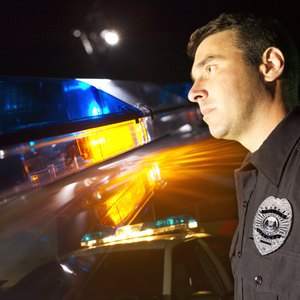
The Internal Revenue Service lets employees deduct out-of-pocket expenses that are customary and necessary in performing their job. To take the deduction, a law enforcement officer must keep track of her expenses. The expenses are itemized on Schedule A and the total carried over to the 1040 federal income tax return. The type of expense determines the deduction amount. As of 2013, some miscellaneous deductions including travel are deductible only to the extent they exceed 2 percent of the adjusted gross income. Half of meal costs are deductible before applying the 2 percent rule. When preparing her tax return, she should compare her total itemized deductions against the standard deduction and take whichever amount is larger.
Uniforms
A law enforcement officer can deduct the cost of his uniforms if his employer requires them in the performance of his job. The uniforms can’t be meant for ordinary street wear. Along with the uniform, he can deduct the cost of boots, shoes, hats, helmets, belts, gloves, jackets and rain gear. Uniform emblems and insignia costs are also deductible. His costs of maintaining the uniforms, including dry cleaning, laundering services, alterations and repairs, are deductible.
Equipment and Supplies
Purchases of job-required equipment and supplies are deductible. Firearms, grips, reloaders, ammunition, ammunition pouches and cleaning equipment are deductible. A law enforcement officer can deduct the cost of her batons, mace, whistles, binoculars, flashlights and batteries, safety equipment and glasses. Her badges, name tags, ear protection, computer and briefcase are also deductible. To make her tax preparation easier, she can keep a separate log of her equipment and supply expenses.
Professional Fees and Continuing Education
A law enforcement officer can deduct the costs of materials, text books, supplies, tuition fees, registration fees and correspondence course fees if he must take continuing education courses as part of his job. Professional license and permit fees, fingerprinting costs and gun range fees are deductible. Professional subscriptions, association fees, union and professional dues are all deductible.
Travel and Meals
Airfare, train and bus fare paid for traveling out of town in performance of a law enforcement officer’s duties are deductible. Her lodging, meals and laundry services are deductible. If she takes the subway, rents a car or takes a cab, she can deduct those costs as well. She should keep her lodging and meal expenses separate.
Personal Vehicle Expenses
If a law enforcement officer uses his personal vehicle for out-of-town business trips, attends out of town educational seminars or picks up his uniforms from the dry cleaners, he can take those expenses as tax deductions. Any parking fees or tolls he pays are also deductible.
Telephone, Self-Defense and Informant Fees
If a law enforcement officer uses a cell phone, pager, beeper or answering machine in the performance of his duties, those amounts can be deducted. The tuition for self-defense courses and the fees he pays to law enforcement informants are likewise tax-deductible.
References
Writer Bio
Based in St. Petersburg, Fla., Karen Rogers covers the financial markets for several online publications. She received a bachelor's degree in business administration from the University of South Florida.

